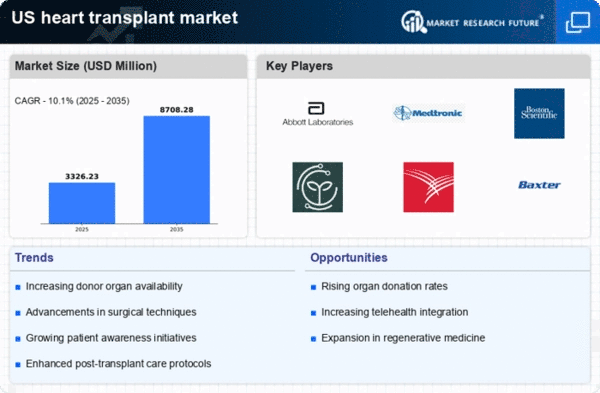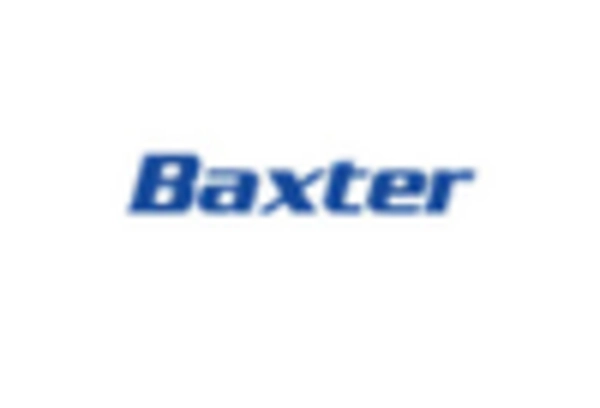Rising Incidence of Heart Disease
The heart transplant market is experiencing growth due to the increasing prevalence of heart disease in the US. According to the CDC, heart disease remains the leading cause of death, accounting for approximately 697,000 deaths annually. This alarming statistic indicates a growing need for heart transplants as a treatment option for patients with severe heart conditions. As the population ages and lifestyle-related factors contribute to cardiovascular issues, the demand for heart transplants is likely to rise. Furthermore, advancements in surgical techniques and post-operative care are enhancing patient outcomes, making heart transplants a more viable option for those suffering from end-stage heart failure. The heart transplant market is thus positioned to expand as healthcare providers seek to address the escalating burden of heart disease.
Advancements in Post-Transplant Care
Advancements in post-transplant care are playing a pivotal role in the heart transplant market. Improved immunosuppressive therapies and personalized medicine approaches are enhancing patient outcomes and reducing the risk of organ rejection. The introduction of new medications and monitoring technologies allows for better management of transplant recipients, leading to longer survival rates and improved quality of life. As a result, the heart transplant market is witnessing a shift towards more comprehensive care models that focus on long-term patient management. This trend not only supports the sustainability of heart transplants but also encourages more patients to consider transplantation as a viable option for treating end-stage heart disease. The ongoing research and development in this area are likely to further bolster the market as healthcare providers strive to optimize post-transplant care.
Innovations in Transplant Technology
Innovations in transplant technology are significantly impacting the heart transplant market. The development of advanced surgical techniques, such as minimally invasive procedures and robotic-assisted surgeries, is improving patient recovery times and outcomes. Additionally, the introduction of new organ preservation methods, such as normothermic perfusion, is extending the viability of donor hearts, thereby increasing the number of successful transplants. The heart transplant market is also witnessing the emergence of artificial hearts and ventricular assist devices, which serve as temporary solutions for patients awaiting transplants. These technological advancements not only enhance the efficiency of heart transplants but also expand the potential donor pool, ultimately contributing to market growth. As these innovations continue to evolve, they are likely to play a crucial role in shaping the future of heart transplantation.
Growing Support for Organ Donation Initiatives
The heart transplant market is benefiting from a growing support for organ donation initiatives across the US. Public awareness campaigns and educational programs are encouraging individuals to register as organ donors, which is essential for increasing the availability of donor hearts. According to the Organ Procurement and Transplantation Network, there are currently over 100,000 individuals waiting for organ transplants, with a significant portion requiring heart transplants. This increasing awareness and support for organ donation are likely to lead to a rise in the number of available organs, thereby positively impacting the heart transplant market. Furthermore, partnerships between healthcare organizations and non-profits are fostering community engagement and promoting the importance of organ donation, which may further enhance the supply of donor hearts in the coming years.
Increased Investment in Healthcare Infrastructure
Increased investment in healthcare infrastructure is contributing to the growth of the heart transplant market. As hospitals and medical centers enhance their facilities and capabilities, they are better equipped to perform complex heart transplant surgeries. This investment includes upgrading surgical suites, expanding transplant programs, and improving patient care services. According to the American Hospital Association, healthcare spending in the US is projected to reach $6.2 trillion by 2028, indicating a strong commitment to improving healthcare delivery. The heart transplant market stands to benefit from this trend, as enhanced infrastructure can lead to more efficient transplant processes and better patient outcomes. Additionally, increased funding for research and development in transplant medicine may yield new therapies and technologies, further driving market growth.

















Leave a Comment